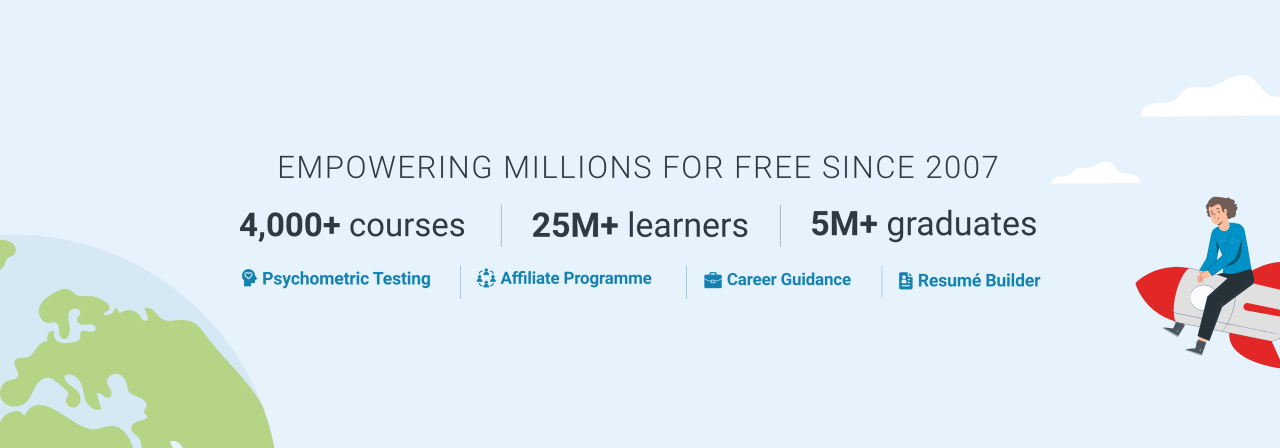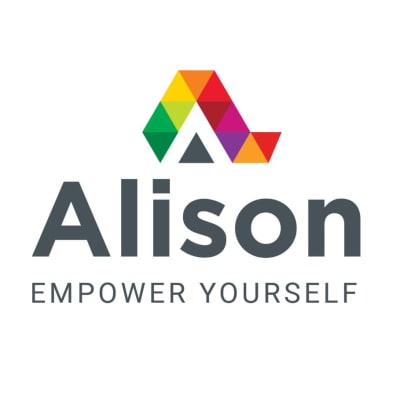
Food Industry Roles and Responsibilities (Free Online Course With Diploma)
Alison Free Online Learning

Key Information
Campus location
Online
Languages
English
Study format
Distance Learning
Duration
6 - 10 hours
Pace
Full time, Part time
Tuition fees
Request info
Application deadline
Request info
Earliest start date
Request info
* free course
Scholarships
Explore scholarship opportunities to help fund your studies
Introduction
In this course, you will learn how food safety and hygiene govern everything that you will do within the catering industry. This type of work includes preparing food, the aftercare of cooked food, being aware of special diets and temperature control. The course also focuses on personal development in the workplace. Learn to be aware of each team member's responsibility to keep a kitchen running smoothly, swiftly and efficiently.
This Free Online Course Includes:
- 6-10 Hours of Learning
- CPD Accreditation
- Final Assessment
Alison Certificates
All Alison courses are free to enrol study and complete. To successfully complete this Diploma course and become an Alison Graduate, you need to achieve 80% or higher in each course assessment. Once you have completed this Diploma course, you have the option to acquire an official Diploma, which is a great way to share your achievement with the world.
Your Alison Diploma is:
- Ideal for sharing with potential employers
- Include it in your CV, professional social media profiles and job applications.
- An indication of your commitment to continuously learn, upskill & achieve high results.
- An incentive for you to continue empowering yourself through lifelong learning.
Alison offers 3 types of Diplomas for completed Diploma courses:
- Digital Diploma: a downloadable Diploma in PDF format immediately available to you when you complete your purchase.
- Diploma: a physical version of your officially branded and security-marked Diploma, posted to you with FREE shipping.
- Framed Diploma: a physical version of your officially branded and security-marked Diploma in a stylish frame, posted to you with FREE shipping.
Gallery
Scholarships and Funding
Curriculum
Food safety and hygiene govern everything that you will do within the catering industry. No matter how great a product may taste or look if it has not been prepared, stored and served to legally-set standards, serious health risks can occur, from minor illnesses to more serious outcomes in compromised groups. Not only does following good food safety and hygiene practices help create a positive image for you and your business but it is also required by law. ‘Food safety’ is the practice of protecting food from anything that could harm a consumer’s health. ‘Food hygiene’ means ensuring that food is free from contamination, wholesome and fit for consumption. A key point is that contamination can occur at any stage of the food production process and, once it has been contaminated, it is unfit for consumption. The three types of contamination are physical, chemical or biological. Physical contamination can include foreign objects in the foodstuff. Chemical contamination can be anything from bleach to contaminated water. Biological contamination focuses on bacteria and viruses that arise from poor hygiene or cooking standards. Methods to avoid this will be analyzed in-depth throughout this course.
Food safety and hygiene laws apply to all catering and hospitality business types, whether they are a small cafe on the corner to a Michelin-starred restaurant. The catering and hospitality industry is one of the biggest industries in the world. In the UK alone, it provides employment to 9% of the population. If you are to succeed in this field, it is vital that you take pride in your personal appearance - both personal hygiene and your clothing should be impeccable. If you arrive at your workplace unkempt, your employer will assume that your working practices are the same: unclean and untidy. It also shows that you are aware of food hygiene regulations and that you take your responsibilities seriously. In addition to keeping a clean appearance, another important skill to have is time management and the ability to multitask. This is because jobs in catering are often high-pressure environments to work in. In order to work effectively and productively, you must learn to manage your time well. See this as an opportunity to improve. Personal development means setting goals and never being afraid to ask questions. If you practice this mindset, it can give your employers trust and confidence in the quality of your work.
Part of personal development is learning how a kitchen works. A kitchen where order does not exist is a complete disaster and the lack of a defined structure can cause confusion. It could lead to more than one person preparing the same dish and neither being aware of the overlap. The brigade system was introduced in the late 19th century by French chef Georges Auguste Escoffier and can be likened to a military rank system. The typical positions you will find in a modern kitchen are head chef, sous chef, chef de partie, commis chef, pastry chef and kitchen porter. Each of these roles has a specific job to do and, once learned, will help keep a kitchen running smoothly. A good chef can only produce quality dishes if they have the correct equipment. An essential tool that can never be left out of a kitchen is a knife. When choosing a knife, comfort is vital - it must feel comfortable in your hand. Expensive does not necessarily mean better, rather select one that fits your needs. This course will cover the various and critical aspects of working in the food industry. Anyone with an interest in catering or the food industry will gain a lot, from a member of waiting for staff just starting out to a chef who would like to reinforce their learning. This course will also be useful to home cooks as it teaches you the reasoning behind correct food-handling methods. Stay-at-home parents, students, childminders and carers can also benefit from learning these kitchen basics.
Module 1
Food Safety in Catering
Food safety and hygiene govern everything that you will do within the catering industry. The following module will explain in greater detail the ways and means to keep the food free from contamination. This will include the preparation of raw food, aftercare of cooked food, temperature control and a guide to the types of bacteria that can present be in food.
Module 2
HACCP and Cross Contamination
HACCP stands for Hazard Analysis Critical Control Point. The HACCP plan, which every food-related business should have, details the business's individualised approach to handling its potential hazards. This includes monitoring and record-keeping which someone with good attention to detail should be in charge of. This module will also cover cross-contamination and the way that you as a food handler can minimise the risk of bacteria entering food that consumers will eat,
Module 3
Developing Skills
Catering and hospitality are one of the biggest industries in the world. In the UK alone, it provides employment for 9% of the population. A key point when applying for a job and maintaining a respected work practice is keeping excellent personal hygiene as well as a friendly personality. Personal development means setting goals and never being afraid to ask questions, this kind of focus in the workplace leads to good and efficient employees.
Module 4
First Assessment
This initial assessment enables you to review your learning, so you can determine your knowledge and understanding of the following modules: Food Safety in Catering, Developing Skills for Employment in the Catering and Hospitality Industry.
Module 5
Healthier Foods and Special Diets
Understand what it means to prepare healthy food and how crucial it is to have a balanced diet that contains fats, carbohydrates, and protein. We have been taught, since childhood, that ‘fats’ are bad for us, but in reality, our bodies need them to function correctly. It is essential to grasp how this can affect people who are intolerant to a specific type of food, has poor lifestyle choices, or have severe health issues. By applying these practices, you can keep your customers happy.
Module 7
Catering Operations, Costs and Menu Planning
A kitchen where order does not exist is a complete disaster. Having order within any business is crucial, but more so in a catering environment. Being aware of each team member's responsibility will help keep a kitchen running smoothly, swiftly & efficiently. Another vital skill for chefs to know is how to manage expenses. If done correctly, a higher rate of gross profit will increase. When creating a menu, it is essential to consider your market, competition, dietary requirements and locality.
Module 8
Basic Knife Skills and Techniques
A knife is a crucial piece of equipment in a kitchen. One of the most important factors to consider when choosing the right knife for you is not how expensive it is, but how comfortable it feels in your hand and what you will be doing with it. In this module, we will also learn how to take care of knives so their life can be prolonged in the kitchen.
Module 9
Second Assessment
This initial assessment enables you to review your learning, so you can determine your knowledge and understanding of the following modules: Healthier Foods and Special Diets, Catering Operations, Costs and Menu Planning, and Basic Knife Skills and Techniques.
Module 10
Course assessment
Program Outcome
What You Will Learn In This Free Course
- Describe how to prepare raw food and the aftercare of cooked food.
- Categorize the types of bacteria that can become present in poorly stored food.
- Analyze personal development goals that lead to an effective employee or team of employees.
- Distinguish between food intolerance and a food allergy.
- Label common kitchen roles and responsibilities.
- Summarize important factors to consider when choosing a knife.
- Indicate how to plan and write a successful menu.
Complete This CPD Accredited Course & Get Your Diploma!
Certify Your Skills
A CPD-accredited Alison Diploma/Certificate certifies the skills you’ve learned.
Stand Out From The Crowd
Add your Alison Certification to your resume and stay ahead of the competition.
Advance in Your Career
Share your Alison Certification with potential employers to show off your skills and capabilities.
Career Opportunities
Supervisor Of Food Preparation And Serving Workers
The food service industry is one of the basic yet most complex cornerstones of globalisation and civilisation.
Food Scientist
Food Scientists have a tall order to honour - come up with food that will appeal to all the senses of their employers and potential customers while nourishing their bodies and soul at competitive prices.
Kitchen Manager
Where ladles stir magical flavours into soups and chefs dish up satisfying recipes, that is the arena where Kitchen Managers wield their magic wand to organise kitchen staff and operations.
Hospital Food Service Supervisor
A nutritious and suitable diet is an integral part of hospital treatment and a crucial aid to recovery. It is a complex task to ensure that all patients at a medical facility receive balanced and tasty meals on time several times a day.